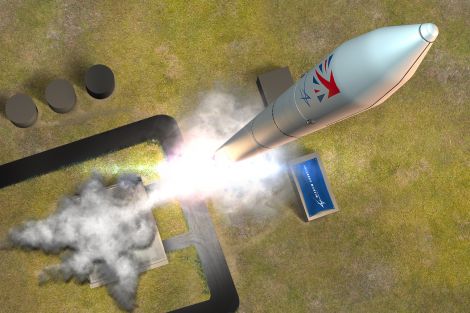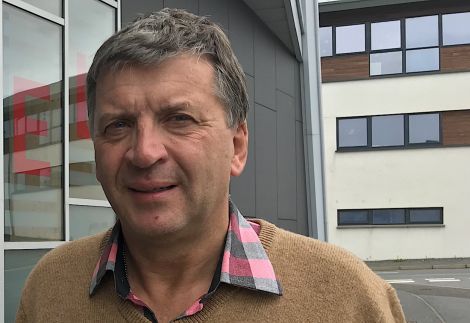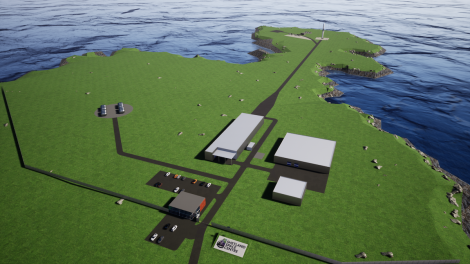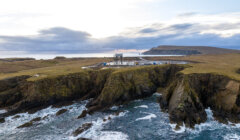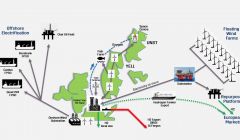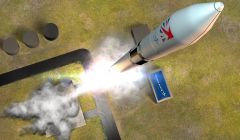Business / ‘Sky no longer the limit’ says space centre boss after aerospace giant confirms move to Shetland
THE PROJECT to build a commercial satellite launch facility in Unst has received a major boost after global aerospace giant Lockheed Martin confirmed it would develop its UK launch operation from Shetland Space Centre (SSC).
The company was initially committed to developing its UK Pathfinder project in conjunction with plans for a spaceport in Sutherland, and it received a £13.5 million UK government grant to do so.
The switch from Sutherland to Shetland, expected by industry insiders for some time, has now been confirmed by the UK Space Agency.
SSC anticipates that by 2024 the spaceport at Lamba Ness could support more than 600 jobs across Scotland, including 140 in Unst and 210 across the wider Shetland region, based on 30 vertical satellite launches per year.
SSC said it is confident it will be able to submit a full planning application for the space port before the end of the year.
The move does not mean the end of the Sutherland space hub as aerospace company Orbex and Highlands and Islands Enterprise continue to work on the project.
Politicians and industry representatives were adamant that Shetland and Sutherland were not in competition but could complement each other. The UK Government is also supporting space satellite launch projects at Machrihanish, Snowdonia and Cornwall.
Lockheed’s move to Shetland was warmly welcomed by SSC chief executive Frank Strang, who has spent the last few years promoting Unst as the ideal location for vertical satellite launches.
“We are absolutely delighted to be welcoming Nik Smith and the Lockheed Martin team to Unst as we develop Shetland Space Centre,” he said.
“This is a significant moment, and we intend to succeed in this new space race. The sky is no longer the limit.
Become a member of Shetland News
“The UK is in a space race with other countries in Europe and beyond, such as Norway, Sweden and New Zealand, to supply payload space in a rapidly growing international market, and we intend to exploit our favourable geographical position to meet this demand.
“As well as launch, we aim to offer a full range of services, including telemetry, tracking and navigation, space situational awareness and data download and storage.”
Lockheed Martin’s UK country executive Nik Smith said a vibrant space sector could stimulate national as well as regional economies.
“From the outset our focus has been on realising the greatest economic benefit for the UK through the spaceflight programme,” he said.
“The transfer of our UK spaceflight operations to Shetland will not only broaden launch options available in the UK, but also ensure the economic benefits of these endeavours are felt more widely.”
A Lockheed spokesperson added: “Our aim is quite simple. We want to be the first country in Europe to offer small satellite manufacturers a direct end to end route to launch, building on the UK’s leading small satellite industry.”
The company is currently in discussions with a preferred partner to provide launch services for its UK Pathfinder project at Unst. An announcement is expected within the next few months.
UK Government minister for Scotland Iain Stewart described the move as a huge step forward for the UK’s ambitious spaceflight programme.
“The UK Government is committed to cementing the UK’s position as a global leader in the space sector. The creation of the Shetland Space Centre is incredibly exciting news and a real boost for the local economy,” he said.
“Our investment in Scottish spaceports is creating hundreds of secure and skilled jobs for people in Scotland.”
Scotland is already home to some of the world’s most innovative satellite manufacturers, and the lack of ample launch facilities in the country has long been seen as one factor that was holding back the sector.
Estimates suggest that the commercial vertical and horizontal launch demand could be worth as much as £3.8 billion to the UK economy over the next decade.
The long-awaited announcement was welcomed locally. Shetland Islands Council political leader Steven Coutts described the news as potentially “transformational.”
“This is tremendous news for Unst, and for Shetland, and puts the isles in the forefront of this growing global industry,” he said.
“The opportunities this potentially provides, both in terms of direct employment and in increased and diversified economic activity across the isles, are very welcome.
“This news comes at a key time for Shetland’s post-Covid recovery, and could be transformational for the isles.
“Shetland has a proven track record in supporting the oil and gas industry over many years, and the council now looks forward to playing its part in supporting the country’s developing space industry.”
Shetland MSP Beatrice Wishart said: “This is fantastic news for the UK space industry, and for Shetland with all the opportunities the development of the Shetland Space Centre will bring to the islands’ supply chain.
“Congratulations to all the team who have worked hard to bring this new industry to Shetland. The isles are in an ideal geographical position for rocket launches. Unst is at the top of the UK and ready to fly high!”
Northern Isles MP Alistair Carmichael added: “This is good news for Unst, for Shetland and for the UK space industry.
“After a challenging year the prospect of new, high-quality jobs in the isles has to be welcomed and is a confirmation of the faith that those behind Shetland Space Centre have put in its location. I hope it will be just the first of many such developments.”
Become a member of Shetland News
Shetland News is asking its many readers to consider paying for membership to get additional features and services: -
- Remove non-local ads;
- Bookmark posts to read later;
- Exclusive curated weekly newsletter;
- Hide membership messages;
- Comments open for discussion.
If you appreciate what we do and feel strongly about impartial local journalism, then please become a member of Shetland News by either making a single payment, or setting up a monthly, quarterly or yearly subscription.






